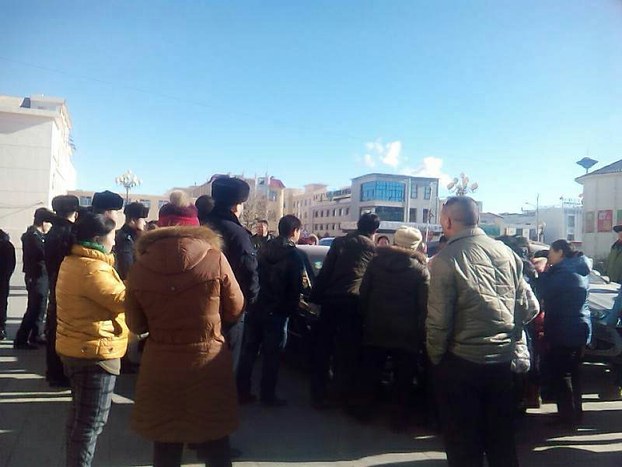On January 25, 2016, a dozen
Mongolian herders from western
Southern (Inner) Mongolia’s
Darhan-Muumingan Banner (“da mao
qi” in Chinese) were taken away
by local police authorities for
contacting “overseas news media
and hostile forces” and
“engaging in national
separatism”. Following several
hours of interrogation, the
herders were released. Many
other herders received
threatening phone calls from the
local police authorities warning
them not to contact any foreign
news media or overseas
organizations.
“At least a dozen herders were
taken to the local police
dispatch stations and
questioned,” an elderly herder
from the affected community told
the Southern Mongolian Human
Rights Information Center (SMHRIC)
over the phone, “many others
were warned over the phone by
the police not to contact any
foreigners.”
“I was also threatened by phone,
and my daughter was taken to the
police dispatch station,” she
added.
Last Wednesday, dozens of
Mongolian herders from
Darhan-Muumingan Banner gathered
in front of the Banner
government building in protest
of the local authorities’
refusal to pay a subsidy to the
herders in partial compensation
for their loss caused by the
authorities’ total ban on
livestock grazing.
After the protest, herders
published some pictures and
video clips of the protest
scenes via social media and gave
interviews to foreign
journalists and human rights
groups.
“I was threatened with
accusations of ‘national
separatism’,” another herder
named Tuyaa told the SMHRIC,
“the police said contacting
those national separatist
individuals and organizations is
considered taking part in the
national separatist activities
as well.”
“Then they wanted to check my
cell phone activities. I
refused,” Tuyaa added.
Mongolian herders from this area
said that the local authorities
implemented the ban on livestock
grazing in 2008 and promised to
pay a certain amount of
subsidies to the herders as part
of redress for their economic
loss. However, since six months
ago, the Banner Government has
stopped paying these subsidies
without providing any reasonable
explanation, according to the
herders.
“Now our very survival is
threatened. We are neither
allowed to raise our livestock
nor obtain the subsidy,” another
frustrated herder told the
SMHRIC.
On the same day, nearly a
hundred herders from western
Southern Mongolia’s Alshaa Left
Banner also gathered before the
local government building,
urging the local government to
halt its campaign of demolishing
herders’ homes and
infrastructure, demanding
protection for the herders’
rights to their grazing lands
and rights to maintain their
traditional way of life.






 Beyond
Great Walls: Environment, Identity, and Development on the Chinese
Grasslands of Inner Mongolia
Beyond
Great Walls: Environment, Identity, and Development on the Chinese
Grasslands of Inner Mongolia China's
Pastoral Region: Sheep and Wool, Minority Nationalities, Rangeland
Degradation and Sustainable Development
China's
Pastoral Region: Sheep and Wool, Minority Nationalities, Rangeland
Degradation and Sustainable Development The
Ordos Plateau of China: An Endangered Environment (Unu Studies on
Critical Environmental Regions)
The
Ordos Plateau of China: An Endangered Environment (Unu Studies on
Critical Environmental Regions)